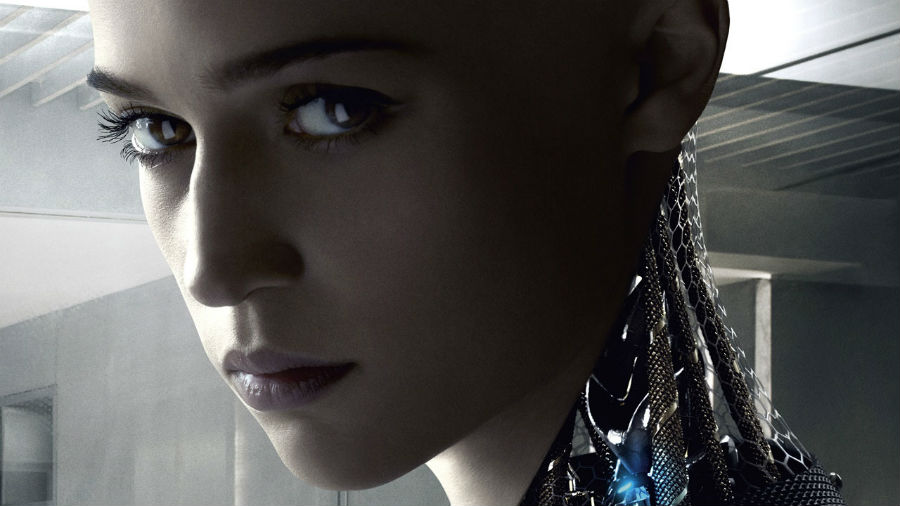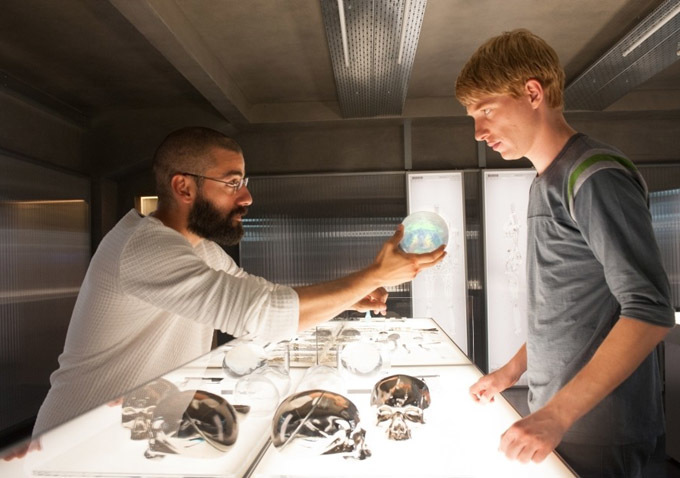Newsletter is here!: Guys, the Newsletter is OUT! Check your SPAM and PROMOTIONS folders if you didn’t get it. A new horror spec reviewed with Apocalypse Now as its inspiration and a lot of other fun stuff. If you’re not on the Newsletter list, sign up here!
Genre: Sci-fi/Drama/Thriller
Premise: A billionaire programmer handpicks a young employee to spend a week at his remote estate and participate in a test involving his latest invention — an artificially intelligent female robot.
About: This will be the directorial debut of Alex Garland, who also wrote the script. Garland has been one of Danny Boyle’s right hand men, writing The Beach, 28 Days Later, and Sunshine. He penned the dark drama adaptation Never Let Me Go a few years ago, most recently scribbled the cult hit “Dredd,” and has also written drafts of Halo and Logan’s Run. In other words, he’s big time. This script sold last year. (Addition) This review originally appeared in the newsletter last year. Off of the cool trailer that debuted last week, I decided to post the review on the site.
Writer: Alex Garland
Details: 114 pages – undated – version “.08” (which leaves this draft legally over the limit)
Garland’s been hit or miss with me. He hit with 28 Days Later and Dredd but wrote two movies that utterly fell apart in their final acts in Sunshine and The Beach. I’d almost rather watch a bad movie from start to finish than watch one that starts well and then collapses. Then again, Boyle was guiding Garland along during those films, so maybe it was him who screwed them up.
I decided to read Ex Machina due to its “spec-friendly” nature. It’s a small character driven film hidden inside a sci-fi concept. The idea with any screenplay is to draw them in with the flashy premise, then make them stay with your characters.
Ex Machina introduces us to computer whiz Caleb, a young man who cares more about beating his personal 24 hour coding record than he does trolling the local Starbucks in hopes of convincing an artsy chick to give him her number. Caleb is currently coding a program that appears to be for a contest, a contest he’s desperately trying to win. And to his amazement, he does just that.
It’s only once we’re in a chauffer-driven limousine that we realize what this prize entails. Nathan Bateman, a young eccentric billionaire, has awarded Caleb one week at his home – to stay and hang out – though the exact reason for the stay hasn’t been revealed yet. As Caleb impatiently asks the chauffeur how long it will be until they get to the estate, the chauffeur calmly responds, “We’ve been driving through his estate for the past two hours.” Yes, Nathan is that kind of rich.
Nathan’s also kind of an asshole, and a douchebag, which we pick up on pretty quickly. He lives off in his own little Hearst Castle Wonderland, completely out of touch with reality. Of course, Nathan’s making so many amazing things happen, it doesn’t really matter. He believes he’s just created the first fully conscious artificially intelligent robot. That’s why Caleb’s been brought in, to test this creation. Which is how we meet Ava.
Ava is a beautiful piece of machinery that doesn’t look anything like a piece of machinery. She’s a flawless perfect stunning blonde woman who just happens to be made up of wires and circuit boards. But you wouldn’t know it by talking to her. She’s calm, clever, even funny. Caleb takes to her immediately. Maybe a little too much.
What follows is a series of tests that Caleb puts Ava through to determine if she’s just programmed to feel things or if she ACTUALLY feels things. For those of you who aren’t super-geeks who have read all the books on the Singularity, creating a robot that’s conscious of itself is basically the Holy Grail. And the more Caleb talks to Ava, the more convinced he is that Nathan has found this Holy Grail.
Ahh, if it were only that easy though. Things start to get messy. Caleb begins to suspect that Nathan is fucking with him. He just can’t figure out why or what about. He also begins to have feelings for Ava, something that would’ve sounded ridiculous at the start of all this, but now seems quite natural. He also learns that Ava hates her creator and would do anything to get away from him. Would Caleb…could Caleb perhaps…help her escape? They could even run off and be together. This becomes the plan as the story pushes towards its final act. That is until Caleb starts to wonder if Ava is playing him too.
Ex Machina reminded me that there are two ways you can start a screenplay. You can go the “introduce the main character’s world first” route, where you show Luke’s life as a frustrated wind farmer who wishes he were a star fighter battling the Empire. This is the method taught in most screenwriting books. The other method is to “jump right into it.” In this approach, you skip all those character establishing scenes and throw us into the story, as they do here with Ex Machina. I mean we have a single scene – Caleb writing code – before he’s off to meet Nathan.
There are pros and cons to each. In the “introduce the world” scenario, we get to know the character better. We understand his world, his backstory, his hopes, his dreams, his flaws. Because we know him better, we’re more likely to relate to him and root for him. The problem with this approach is that it can be boring. Scripts need to move and if we’re sitting around for ten scenes just “getting to know someone,” we’re probably going to get bored.
The “jump right into it” route takes care of this issue. We’re entertained right away so we don’t need to worry about that pesky drawn-out first act. The problem with this approach, of course, is that we don’t get to know our character as well, which means you run the risk of the audience not giving a shit because they don’t feel close to the person leading us through the journey.
A common solution is to quasi-combine the two options. For example, The Matrix throws us into the story right away, but then takes a step back and introduces us to Neo’s world. Or, you can throw us into the story right away, like Garland does here, and try to slip in bits and pieces of your protagonist’s life where you can. Which is hard because the best way to set up a character is to see him in his environment. But it can be done. For instance, Garland uses this scene of anticipation where we’re driving to Nathan’s mansion to slip in a few details about Caleb’s character. The point is, it’s tricky. But as long as you understand the challenge, it’s possible to overcome it.
As for the rest of the screenplay, I thought it was good, but not great. I loved the use of the “Great Gatsby”-like mystery box of “Who is Nathan?” I was pumped to find out. I also enjoyed the initial scenes between Caleb and Ava. But as the script went on, it started to feel like I was ahead of the story. What pulled me into this script were the mysteries. And those seemed to be answered fairly quickly. Afterwards, we’re left with some compelling questions and interactions (what is consciousness? Can a man fall in love with a machine? Is this all a game?) but the script was never as effective as when it had those mysteries going.
This is something I’ve noticed in a lot of scripts. Writers include early mysteries because they’re easy to create. Everything about the world is new, so it’s not hard to say, “What’s this person hiding?” However once they’ve got you hooked, they move on and focus on other things. But it’s kind of like hooking a kid on candy and then trying to feed him broccoli. The kid doesn’t want broccoli. They want candy! It is harder to introduce mysteries as the story continues, but it’s worth it to try. I know I would’ve liked an extra mystery or two in that second and third act.
Despite the eerie tone of this man cut off from society left to roam an immense mansion where he’s being watched by numerous cameras, his only interaction being with this weird creepy billionaire and his robot, the story doesn’t quite have the endurance to make it to the finish line. I think what it needed was another subplot, a little more going on inside the house, and a solid mid-point shift. Remember, mid-points are where you throw something at your audience that changes the story up a little so the second half doesn’t feel like a repeat of the first half. I didn’t see that here, and the story suffered a little as a result.
Still, the writing was strong, as you’d expect from someone as accomplished as Garland, and it passed the ultimate story test: Did I want to find out what happened in the end? The answer to that question was yes, and for that reason, it’s worth the read.
[ ] what the hell did I just read?
[ ] wasn’t for me
[x] worth the read
[ ] impressive
[ ] genius
What I learned: The script needed another mystery or two. And I think I found an opportunity that Garland missed. When we first meet Nathan, he gives Caleb a security card that he explains will let him into some rooms, but not all of them. What Garland probably should’ve done was highlight one specific room that was locked that Caleb was never allowed to go inside. I’ve never seen this device NOT work before. You use that room throughout as a mystery box, with the audience desperately anticipating what’s inside. That would’ve helped here, as the script ran out of mysteries too early.



